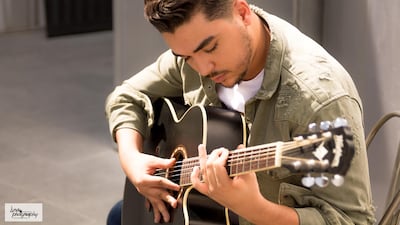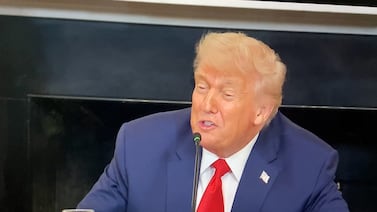He was once that pleasant voice in the background, but now Mahdi Baccouch is front and centre.
After years spent honing his craft in his native Tunisia and across the UAE in cafes, restaurants and at weddings, Baccouch finally achieved his career dream when he was signed to Dubai-based record label Universal Music Mena.
The long-awaited record deal meant a total career revamp – the suits of old were cast aside in favour of a more slick youthful get-up; the free gigs in Dubai cafes were over, replaced with full-blooded concerts with a backing band; and wedding appearances now only undertaken by special request.
And then there's the music video which Baccouch shot on a lavish yacht on Dubai Marina for his latest single Bethadaki.
“Yeah, this is certainly a change, but a good one,” the singing talent says from his base in Dubai. “Shooting that video was an interesting experience because you are performing in a way and the weather was very hot. But it was fine as the song kind of suits it.”
Bethadaki is tuneful and breezy enough to be the soundtrack for a summer day out. Baccouch's sweet and mellow voice sails over a sea of strings and oriental instrumentation backed with dance music beats. It is tailor-made for radio with a selection of regional stations already placing it on their regular rotations.
The distinct feature about the track is only known to those who know Baccouch personally though. The smooth, elongated Lebanese dialect of Arabic noticeable in Bethadaki is a far cry from the singer's everyday Tunisian accent.
It makes the track even more impressive as his Lebanese impression is so pitch-perfect that radio stations across Lebanon are also playing the track.
Baccouch doesn't feel it is disingenuous considering that most of his fans are aware of his background. He believes the Lebanese dialect is an instrument in its own right. "It is especially suited for love songs," he explains.
“There is a warmth to the Lebanese dialect. It is soft, sweet and very affectionate. I grew up loving the songs of [veteran Lebanese artists] Fayrouz, Elissa and Wael Kfoury. So when I sing in that kind of style, I just feel that language is the best to get the songs across.”
UAE a land of opportunity
That considered approach to his craft comes from his studies of music composition. Born in Tunisia, Baccouch attended the capital city's music conservatory in addition to fronting his own band – one that performed traditional folk and pop covers. He was a regular visitor to Dubai as his father was working there until he moved there five years ago to further his career.
I ask if that move was a rather brave decision considering the region lacks the gigging opportunities that Cairo or Beirut offer.
___________________
Read more:
'I'm so proud of my heritage, so proud of you': Shakira tells crowd as she performs in ancestral home of Lebanon
Is Mohammed Assaf working on new music with Marwan Khoury and Ali Saber?
Mawazine 2018: Marwan Khoury on showcasing the depths of Arabic music's history
___________________
That depends on what you are looking for, he replies. "You have to understand that in Tunis, where you can play live, there is no real music production companies or major labels," he explains. "I mean, I didn't come to the UAE to just sing in restaurants or parties, but to be close to these major companies who will hopefully see what I can offer."
More new material on the way
While the live gigs were helpful in making ends meet, it was a Mother's Day single that eventually gave him his big break. Released online in 2016, the original track Ommi Ya Malaki (My Mother, My Angel) that was sung in Lebanese, was an immediate hit – it was its social media appeal that attracted the attention of the suits at Universal Music Mena.
Baccouch has signed a six-song deal with the label and plans to demonstrate his versatility with follow-up tunes that will include Egyptian pop songs, ballads, and of course more Lebanese love songs.
And they will all have a UAE flavour with the artist planning to continue to maintain his base in Dubai.
"I mean, everyone knows about Lebanon and its music, for example, but what the UAE offers is different," he tells me. "There are so many talented people here from the Arab world – people from Lebanon, Morocco and Egypt who work in the arts – so I feel that I am getting the best of many worlds."
2025 Fifa Club World Cup groups
Group A: Palmeiras, Porto, Al Ahly, Inter Miami.
Group B: Paris Saint-Germain, Atletico Madrid, Botafogo, Seattle.
Group C: Bayern Munich, Auckland City, Boca Juniors, Benfica.
Group D: Flamengo, ES Tunis, Chelsea, (Leon banned).
Group E: River Plate, Urawa, Monterrey, Inter Milan.
Group F: Fluminense, Borussia Dortmund, Ulsan, Mamelodi Sundowns.
Group G: Manchester City, Wydad, Al Ain, Juventus.
Group H: Real Madrid, Al Hilal, Pachuca, Salzburg.
Heather, the Totality
Matthew Weiner,
Canongate
Company%20profile
%3Cp%3E%3Cstrong%3EName%3A%3C%2Fstrong%3E%20Homie%20Portal%20LLC%3C%2Fp%3E%0A%3Cp%3E%3Cstrong%3EStarted%3A%3C%2Fstrong%3E%20End%20of%202021%C2%A0%3C%2Fp%3E%0A%3Cp%3E%3Cstrong%3EFounder%3A%20%3C%2Fstrong%3EAbdulla%20Al%20Kamda%C2%A0%3C%2Fp%3E%0A%3Cp%3E%3Cstrong%3EBased%3A%3C%2Fstrong%3E%20Dubai%3C%2Fp%3E%0A%3Cp%3E%3Cstrong%3ESector%3A%3C%2Fstrong%3E%20FinTech%C2%A0%3C%2Fp%3E%0A%3Cp%3E%3Cstrong%3EInitial%20investment%3A%3C%2Fstrong%3E%20Undisclosed%C2%A0%3C%2Fp%3E%0A%3Cp%3E%3Cstrong%3ECurrent%20number%20of%20staff%3A%3C%2Fstrong%3E%2014%C2%A0%3C%2Fp%3E%0A%3Cp%3E%3Cstrong%3EInvestment%20stage%3A%20%3C%2Fstrong%3ELaunch%C2%A0%3C%2Fp%3E%0A%3Cp%3E%3Cstrong%3EInvestors%3A%3C%2Fstrong%3E%20Self-funded%3C%2Fp%3E%0A
KILLING OF QASSEM SULEIMANI
More on Quran memorisation:
More from Rashmee Roshan Lall
WITHIN%20SAND
%3Cp%3EDirector%3A%20Moe%20Alatawi%3C%2Fp%3E%0A%3Cp%3EStarring%3A%20Ra%E2%80%99ed%20Alshammari%2C%20Adwa%20Fahd%2C%20Muhand%20Alsaleh%3C%2Fp%3E%0A%3Cp%3ERating%3A%203%2F5%3C%2Fp%3E%0A
Company%20profile
%3Cp%3EName%3A%20Cashew%0D%3Cbr%3EStarted%3A%202020%0D%3Cbr%3EFounders%3A%20Ibtissam%20Ouassif%20and%20Ammar%20Afif%0D%3Cbr%3EBased%3A%20Dubai%2C%20UAE%0D%3Cbr%3EIndustry%3A%20FinTech%0D%3Cbr%3EFunding%20size%3A%20%2410m%0D%3Cbr%3EInvestors%3A%20Mashreq%2C%20others%0D%3C%2Fp%3E%0A
Analysis
Maros Sefcovic is juggling multiple international trade agreement files, but his message was clear when he spoke to The National on Wednesday.
The EU-UAE bilateral trade deal will be finalised soon, he said. It is in everyone’s interests to do so. Both sides want to move quickly and are in alignment. He said the UAE is a very important partner for the EU. It’s full speed ahead - and with some lofty ambitions - on the road to a free trade agreement.
We also talked about US-EU tariffs. He answered that both sides need to talk more and more often, but he is prepared to defend Europe's position and said diplomacy should be a guiding principle through the current moment.
Company profile
Name: Dukkantek
Started: January 2021
Founders: Sanad Yaghi, Ali Al Sayegh and Shadi Joulani
Based: UAE
Number of employees: 140
Sector: B2B Vertical SaaS(software as a service)
Investment: $5.2 million
Funding stage: Seed round
Investors: Global Founders Capital, Colle Capital Partners, Wamda Capital, Plug and Play, Comma Capital, Nowais Capital, Annex Investments and AMK Investment Office
The specs
Engine: 2.0-litre 4-cylinder turbo
Power: 240hp at 5,500rpm
Torque: 390Nm at 3,000rpm
Transmission: eight-speed auto
Price: from Dh122,745
On sale: now
Electoral College Victory
Trump has so far secured 295 Electoral College votes, according to the Associated Press, exceeding the 270 needed to win. Only Nevada and Arizona remain to be called, and both swing states are leaning Republican. Trump swept all five remaining swing states, North Carolina, Georgia, Pennsylvania, Michigan and Wisconsin, sealing his path to victory and giving him a strong mandate.
Popular Vote Tally
The count is ongoing, but Trump currently leads with nearly 51 per cent of the popular vote to Harris’s 47.6 per cent. Trump has over 72.2 million votes, while Harris trails with approximately 67.4 million.
More from Neighbourhood Watch:
Company%C2%A0profile
%3Cp%3E%3Cstrong%3ECompany%20name%3A%20%3C%2Fstrong%3ELeap%0D%3Cbr%3E%3Cstrong%3EStarted%3A%20%3C%2Fstrong%3EMarch%202021%0D%3Cbr%3E%3Cstrong%3EFounders%3A%3C%2Fstrong%3E%20Ziad%20Toqan%20and%20Jamil%20Khammu%0D%3Cbr%3E%3Cstrong%3EBased%3A%3C%2Fstrong%3E%20Dubai%0D%3Cbr%3E%3Cstrong%3ESector%3A%20%3C%2Fstrong%3EFinTech%0D%3Cbr%3E%3Cstrong%3EInvestment%20stage%3A%20%3C%2Fstrong%3EPre-seed%0D%3Cbr%3E%3Cstrong%3EFunds%20raised%3A%3C%2Fstrong%3E%20Undisclosed%0D%3Cbr%3E%3Cstrong%3ECurrent%20number%20of%20staff%3A%20%3C%2Fstrong%3ESeven%3C%2Fp%3E%0A
MOUNTAINHEAD REVIEW
Starring: Ramy Youssef, Steve Carell, Jason Schwartzman
Director: Jesse Armstrong
Rating: 3.5/5
GRAN%20TURISMO
%3Cp%3E%3Cstrong%3EDirector%3A%3C%2Fstrong%3E%20Neill%20Blomkamp%3C%2Fp%3E%0A%3Cp%3E%3Cstrong%3EStars%3A%3C%2Fstrong%3E%20David%20Harbour%2C%20Orlando%20Bloom%2C%20Archie%20Madekwe%2C%20Darren%20Barnet%3C%2Fp%3E%0A%3Cp%3E%3Cstrong%3ERating%3A%3C%2Fstrong%3E%203%2F5%3C%2Fp%3E%0A
RESULT
Argentina 0 Croatia 3
Croatia: Rebic (53'), Modric (80'), Rakitic (90' 1)
Fast%20X
%3Cp%3E%3Cstrong%3EDirector%3A%3C%2Fstrong%3E%20Louis%20Leterrier%3C%2Fp%3E%0A%3Cp%3E%3Cstrong%3EStars%3A%3C%2Fstrong%3E%20Vin%20Diesel%2C%20Michelle%20Rodriguez%2C%20Jason%20Statham%2C%20Tyrese%20Gibson%2C%20Ludacris%2C%20Jason%20Momoa%2C%20John%20Cena%2C%20Jordana%20Brewster%2C%20Nathalie%20Emmanuel%2C%20Sung%20Kang%2C%20Brie%20Larson%2C%20Helen%20Mirren%20and%20Charlize%20Theron%3C%2Fp%3E%0A%3Cp%3E%3Cstrong%3ERating%3A%3C%2Fstrong%3E%203%2F5%3C%2Fp%3E%0A
SCHEDULE FOR SHOW COURTS
Centre Court - from 4pm (UAE time)
Angelique Kerber (1) v Irina Falconi
Martin Klizan v Novak Djokovic (2)
Alexandr Dolgopolov v Roger Federer (3)
Court One - from 4pm
Milos Raonic (6) v Jan-Lennard Struff
Karolina Pliskova (3) v Evgeniya Rodina
Dominic Thiem (8) v Vasek Pospisil
Court Two - from 2.30pm
Juan Martin Del Potro (29) v Thanasi Kokkinakis
Agnieszka Radwanska (9) v Jelena Jankovic
Jeremy Chardy v Tomas Berdych (11)
Ons Jabeur v Svetlana Kuznetsova (7)
The National's picks
4.35pm: Tilal Al Khalediah
5.10pm: Continous
5.45pm: Raging Torrent
6.20pm: West Acre
7pm: Flood Zone
7.40pm: Straight No Chaser
8.15pm: Romantic Warrior
8.50pm: Calandogan
9.30pm: Forever Young
Porsche Taycan Turbo specs
Engine: Two permanent-magnet synchronous AC motors
Transmission: two-speed
Power: 671hp
Torque: 1050Nm
Range: 450km
Price: Dh601,800
On sale: now
MATCH INFO
Real Madrid 2
Vinicius Junior (71') Mariano (90 2')
Barcelona 0
How the bonus system works
The two riders are among several riders in the UAE to receive the top payment of £10,000 under the Thank You Fund of £16 million (Dh80m), which was announced in conjunction with Deliveroo's £8 billion (Dh40bn) stock market listing earlier this year.
The £10,000 (Dh50,000) payment is made to those riders who have completed the highest number of orders in each market.
There are also riders who will receive payments of £1,000 (Dh5,000) and £500 (Dh2,500).
All riders who have worked with Deliveroo for at least one year and completed 2,000 orders will receive £200 (Dh1,000), the company said when it announced the scheme.
Name: Brendalle Belaza
From: Crossing Rubber, Philippines
Arrived in the UAE: 2007
Favourite place in Abu Dhabi: NYUAD campus
Favourite photography style: Street photography
Favourite book: Harry Potter
'Brazen'
Director: Monika Mitchell
Starring: Alyssa Milano, Sam Page, Colleen Wheeler
Rating: 3/5
World Cricket League Division 2
In Windhoek, Namibia - Top two teams qualify for the World Cup Qualifier in Zimbabwe, which starts on March 4.
UAE fixtures
Thursday February 8, v Kenya; Friday February 9, v Canada; Sunday February 11, v Nepal; Monday February 12, v Oman; Wednesday February 14, v Namibia; Thursday February 15, final
THE BIO
Family: I have three siblings, one older brother (age 25) and two younger sisters, 20 and 13
Favourite book: Asking for my favourite book has to be one of the hardest questions. However a current favourite would be Sidewalk by Mitchell Duneier
Favourite place to travel to: Any walkable city. I also love nature and wildlife
What do you love eating or cooking: I’m constantly in the kitchen. Ever since I changed the way I eat I enjoy choosing and creating what goes into my body. However, nothing can top home cooked food from my parents.
Favorite place to go in the UAE: A quiet beach.
CREW
%3Cp%3E%3Cstrong%3EDirector%3A%20%3C%2Fstrong%3ERajesh%20A%20Krishnan%3C%2Fp%3E%0A%3Cp%3E%3Cstrong%3EStarring%3A%20%3C%2Fstrong%3ETabu%2C%20Kareena%20Kapoor%20Khan%2C%20Kriti%20Sanon%26nbsp%3B%3C%2Fp%3E%0A%3Cp%3E%3Cstrong%3ERating%3A%3C%2Fstrong%3E%203.5%2F5%3C%2Fp%3E%0A
Mental%20health%20support%20in%20the%20UAE
%3Cp%3E%E2%97%8F%20Estijaba%20helpline%3A%208001717%3Cbr%3E%E2%97%8F%20UAE%20Ministry%20of%20Health%20and%20Prevention%20hotline%3A%20045192519%3Cbr%3E%E2%97%8F%20UAE%20Mental%20health%20support%20line%3A%20800%204673%20(Hope)%3Cbr%3EMore%20information%20at%20hope.hw.gov.ae%3C%2Fp%3E%0A
Courses%20at%20Istituto%20Marangoni%2C%20Dubai
%3Cp%3E%3Cstrong%3EUndergraduate%20courses%3C%2Fstrong%3E%3Cbr%3EInterior%20Design%3B%20Product%20Design%3B%20Visual%20Design%3B%20Fashion%20Design%20%26amp%3B%20Accessories%3B%20Fashion%20Styling%20%26amp%3B%20Creative%20Direction%3B%20Fashion%20Business%3B%20Foundation%20in%20Fashion%3B%20Foundation%20in%20Design%3Cbr%3E%3Cstrong%3EProfessional%20courses%3C%2Fstrong%3E%3Cbr%3EFashion%20e-Commerce%20%26amp%3B%20Digital%20Marketing%3B%20Fashion%20Entrepreneurship%3B%20Fashion%20Luxury%20Retail%20and%20Visual%20Merchandising%3Cbr%3E%3Cstrong%3EShort%20courses%3C%2Fstrong%3E%3Cbr%3EFashion%20design%3B%20Fashion%20Image%20%26amp%3B%20Styling%3B%20Fashion%20Trend%20Forecasting%3B%20Interior%20Design%3B%20Digital%20Art%20in%20Fashion%3Cbr%3EMore%20information%20is%20at%20%3Ca%20href%3D%22https%3A%2F%2Fwww.istitutomarangoni.com%2Fen%3Futm_source%3DLocal%26utm_medium%3Dorganic%26utm_campaign%3Dgmb%26utm_content%3Ddubai%22%20target%3D%22_self%22%3Ewww.istitutomarangoni.com%3C%2Fa%3E%3C%2Fp%3E%0A
DEADPOOL & WOLVERINE
Starring: Ryan Reynolds, Hugh Jackman, Emma Corrin
Director: Shawn Levy
Rating: 3/5
Bib%20Gourmand%20restaurants
%3Cp%3EAl%20Khayma%0D%3Cbr%3EBait%20Maryam%0D%3Cbr%3EBrasserie%20Boulud%0D%3Cbr%3EFi'lia%0D%3Cbr%3Efolly%0D%3Cbr%3EGoldfish%0D%3Cbr%3EIbn%20AlBahr%0D%3Cbr%3EIndya%20by%20Vineet%0D%3Cbr%3EKinoya%0D%3Cbr%3ENinive%0D%3Cbr%3EOrfali%20Bros%0D%3Cbr%3EReif%20Japanese%20Kushiyaki%0D%3Cbr%3EShabestan%0D%3Cbr%3ETeible%3C%2Fp%3E%0A
The specs
Engine: 6.2-litre V8
Transmission: seven-speed auto
Power: 420 bhp
Torque: 624Nm
Price: from Dh293,200
On sale: now
More from Neighbourhood Watch:
UAE currency: the story behind the money in your pockets
Hili 2: Unesco World Heritage site
The site is part of the Hili archaeological park in Al Ain. Excavations there have proved the existence of the earliest known agricultural communities in modern-day UAE. Some date to the Bronze Age but Hili 2 is an Iron Age site. The Iron Age witnessed the development of the falaj, a network of channels that funnelled water from natural springs in the area. Wells allowed settlements to be established, but falaj meant they could grow and thrive. Unesco, the UN's cultural body, awarded Al Ain's sites - including Hili 2 - world heritage status in 2011. Now the most recent dig at the site has revealed even more about the skilled people that lived and worked there.
The specs
Engine: 2-litre or 3-litre 4Motion all-wheel-drive Power: 250Nm (2-litre); 340 (3-litre) Torque: 450Nm Transmission: 8-speed automatic Starting price: From Dh212,000 On sale: Now
MATCH INFO
Osasuna 1 Real Madrid 4
Osasuna: García (14')
Real Madrid: Isco (33'), Ramos (38'), Vázquez (84'), Jovic (90' 2)
The five new places of worship
Church of South Indian Parish
St Andrew's Church Mussaffah branch
St Andrew's Church Al Ain branch
St John's Baptist Church, Ruwais
Church of the Virgin Mary and St Paul the Apostle, Ruwais






